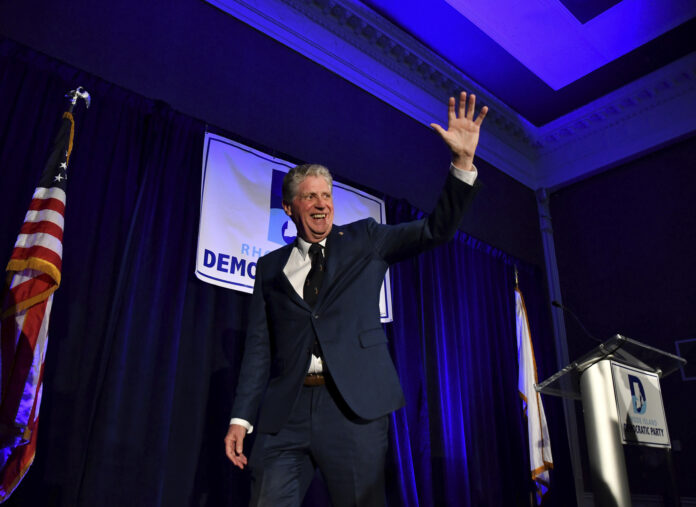
PROVIDENCE (AP) – Now that R.I. Gov. Daniel J. McKee has won his first full term in office, the Democrat is developing a vision for the state for the next decade.
McKee and Lt. Gov. Sabina Matos, a fellow Democrat, released a working draft of their “RI 2030” plan last month, based on community conversations about education, workforce, children and family issues, and other priorities.
With both of their wins in the general election, they plan to get more public input, revise the ideas and create a strong agenda for the state’s future, the governor’s office said Wednesday. McKee defeated Republican challenger Ashley Kalus, and Matos defeated Republican challenger Aaron Guckian.
McKee said in his victory speech that he would continue working to help families and municipalities, and create jobs. His top priority is to strengthen the education system, to raise incomes in every community, and to ensure there are enough trained workers to fill jobs that are created, he said. He set a goal for Rhode Island students to do as well as, or better than, Massachusetts students on standardized tests by 2030.
“Let’s make sure that we do what what we need to do to bring this state to a level that we’ve never seen before because we have momentum like we’ve never seen before in this state,” McKee said. “We’re going to keep it, and we’re just getting started.”
McKee is a former lieutenant governor who became governor in March 2021 when two-term Gov. Gina Raimondo was tapped as U.S. commerce secretary. He was the heavy favorite in the liberal state as both a Democrat and incumbent, and was endorsed by a host of large unions. Kalus is a business owner and political novice who moved to the state last year.
McKee sought to differentiate himself from Kalus by talking about how he is a lifelong Rhode Islander with decades of public service in the state. Like Democrats nationwide, he worked to keep abortion rights front and center in the campaign and convince voters that he would champion reproductive rights.
Only about 15% of registered voters in the state are Republicans. Kalus tried to convince independent voters, who make up more than 40% of the electorate, that McKee is an insider politician who is beholden to special interests. She told voters she would end the “I know a guy system” in Rhode Island and help working families.
Kalus, who owns a COVID-19 testing company that is suing the state over a canceled contract, moved to Rhode Island last year from Illinois and previously worked for former Illinois Republican Gov. Bruce Rauner. She bought a home in Newport, registered to vote in Rhode Island as a Republican in January and declared her candidacy in March. With a week to go before the election, profane texts were shared with media outlets that Kalus sent a contractor in 2018 and 2019 in Chicago.
Kalus thanked her supporters in her concession speech, telling them it has been the “honor of a lifetime” to serve as their voice. She does not plan to run for governor again but will stay involved to make Rhode Island the most affordable place to live, work and raise a family, her campaign said Wednesday.
McKee was endorsed by large unions representing teachers, firefighters, building trades, auto workers and others. Planned Parenthood’s political action committee in Rhode Island and gun safety groups also endorsed McKee. He survived a tough primary, earning only one-third of the vote against former CVS executive Helena Foulkes, who saw a late surge in the polls, and Secretary of State Nellie Gorbea.
Independent candidates Zachary Hurwitz and Paul Rianna and libertarian Elijah Gizzarelli were also on the ballot in the governor’s race. Independent candidate Ross McCurdy was on the ballot in the lieutenant governor’s race. McKee nominated Matos to be lieutenant governor last year when he succeeded Raimondo.
More than 350,000 votes were cast in the governor’s race, or about 43% of the 815,000 residents eligible to vote, according to unofficial data from the state elections board. Turnout in the 2018 midterm elections was 48% in Rhode Island.
In other statewide races, Democrat Peter Neronha was reelected attorney general; Democrat Gregg Amore was elected secretary of state; and Democrat James Diossa was elected treasurer.











